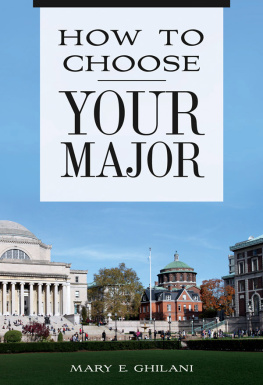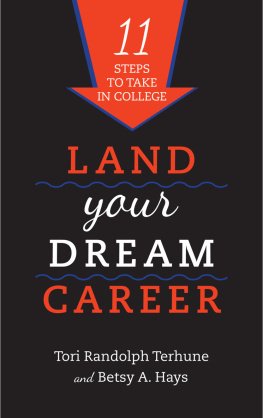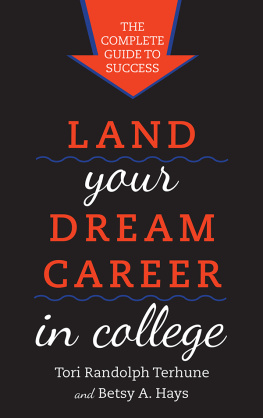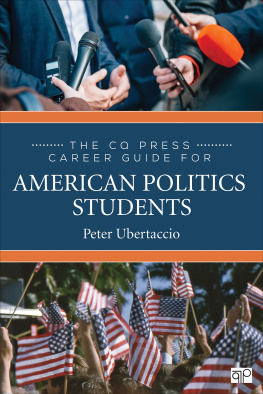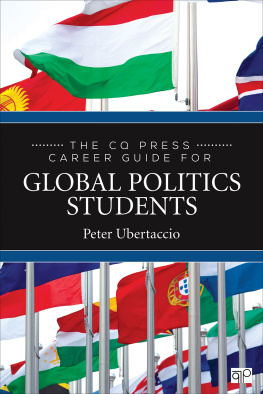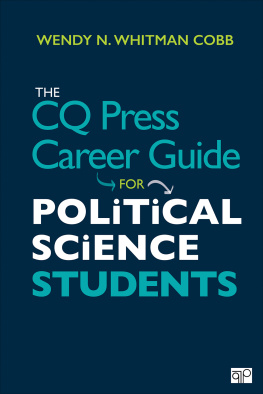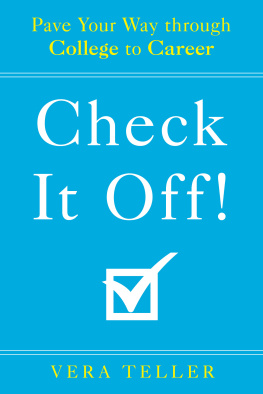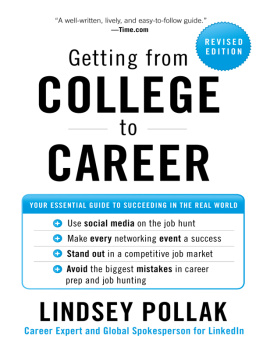How to Choose Your Major
How to Choose Your Major
Mary E. Ghilani

Copyright 2017 by Mary E. Ghilani
All rights reserved. No part of this publication may be reproduced, stored in a retrieval system, or transmitted, in any form or by any means, electronic, mechanical, photocopying, recording, or otherwise, except for the inclusion of brief quotations in a review, without prior permission in writing from the publisher.
Library of Congress Cataloging-in-Publication Data
Names: Ghilani, Mary E., 1958 author.
Title: How to choose your major / Mary E. Ghilani.
Description: Santa Barbara, California : Greenwood, [2017] | Includes bibliographical references and index.
Identifiers: LCCN 2017010832 (print) | LCCN 2017026997 (ebook) | ISBN 9781440856631 (ebook) | ISBN 9781440856624 (alk. paper)
Subjects: LCSH: College majorsUnited States. | College studentsVocational guidanceUnited States.
Classification: LCC LB2361.5 (ebook) | LCC LB2361.5 .G55 2017 (print) | DDC 378.2/41dc23
LC record available at https://lccn.loc.gov/2017010832
ISBN: 978-1-4408-5662-4
EISBN: 978-1-4408-5663-1
212019181712345
This book is also available as an eBook.
Greenwood
An Imprint of ABC-CLIO, LLC
ABC-CLIO, LLC
130 Cremona Drive, P.O. Box 1911
Santa Barbara, California 931161911
www.abc-clio.com
This book is printed on acid-free paper 
Manufactured in the United States of America
Contents
Although writing is often considered a solitary activity, no book is written in isolation. Having said that, Id like to acknowledge the assistance of the following people:
Thanks to Dr. Janet E. Wall, CEUOnestop.com, for her helpful suggestions to improve the book.
Dr. Spencer Niles, dean and professor, School of Education, The College of William & Mary, for editing the Hope-Centered Model of Career Development section.
Shirley Yanovich, chair of the CIS program at Luzerne County Community College, for editing the Career Opportunities in the Computer Industry chart.
Dr. Frank Derby, chair of Surveying Engineering Program at Penn State University, and Dr. Charles Ghilani, Professor Emeritus, Surveying Engineering at Penn State, for providing an excellent definition of Surveying Engineering.
Mia Bassham, director of the Library at Luzerne County Community College and Kate Cummings, Electronic Resource Librarian at Luzerne County Community College, for reviewing the section on Library Science for accuracy.
Lori Major, CPA, professor at Luzerne County Community College, for reviewing the section on accounting for accuracy.
Barbara Bissonnette, principal of Forward Motion Coaching, for providing some useful tips to help Aspergers students choose a major.
Margaret Krantz, director of Hanover College Career Center, for granting permission to reprint the Liberal Arts Skills at Work skills charts.
Thanks to the student, whose name I unfortunately cant recall, who first asked me about careers for compassionate people, which I later used as the title for .
And finally, heartfelt thanks, always, to my husband, Chuck, who supported me in whatever endeavor I wanted to pursue.
The best way to predict the future is to plan it.
Peter Drucker
Each fall, about 2.1 million (69.2%) high school students enroll in collegean enrollment rate that has been steady for the past couple of years. More women (72.6%) than men (65.8%) are enrolled in college, and about two in three of those high school graduates who enroll in college attend four-year colleges.
Despite the conversations in the media about the value of a college education, the data is clear that education is becoming a necessity. According to the Bureau of Labor Statistics (BLS), The unemployment rate for recent high school graduates not enrolled in college was 20.7 percent, higher than the rate of 12.6 percent for recent graduates enrolled in college.
While its true that jobs are back after our recent recession, Anthony Carnevale, Tamara Jayasundera, and Artem Gulish write in Americas Divided Recovery: College Haves and Have-Nots, They are not the same jobs that were lost during the recession. The great Recession decimated low-skill blue-collar and clerical jobs, whereas the recovery added primarily high-skill managerial and professional jobs.
The Value of Earning Your Degree
Many people are reconsidering the merits of a college degree. They are wondering if the expensive tuition and amount of student loan debt is worth it in the future. Here are some reasons why earning your degree is still worthwhile:
- College graduates usually earn more money during their working lives than people with only high school diplomas. A 2014 Pew research study revealed that millennial college graduates ages 25 to 32 who are working full time earn more annuallyabout $17,500 more than employed young adults holding only a high school diploma.
- A college degree will make you more marketable. Employers like to hire college graduates because college graduates can think and learn. Graduates with two- or four-year degrees qualify for a greater range of higher-paying entry- and upper-level career positions than those with only a high school degree. Earning a college degree can open doors that would otherwise remain closed.
- Are you really that much smarter if you earn a college degree? In general, the answer is yes. Most college graduates come away with a greater knowledge base and an ability to problem-solve and think analytically, which are all very attractive qualities to a potential employer.
- Attending college provides professional networking opportunities that are not available to those who dont go to college. Many professional organizations have student chapters on college that provide valuable networking opportunities with professionals in a students chosen field.
- Graduates reap other benefits from going to college. Some of the greatest benefits of a college education are the experiences that you gain while attending school. For example, you have the opportunity to meet new people from all over the world and to expand your knowledge base by being introduced to theories and concepts you might not have learned about anywhere else.
All of us have heard those alarming stories about college students who cannot find a job and have mountains of debt loan. Some of these instances may be real, but the media tend to exaggerate the problem. According to the College Board, about 60 percent of students who earned bachelors degrees in 20122013 from the public and private nonprofit institutions borrowed an average of $27,300, The unemployment rate in April 2015 for people between 25 and 34 years old with a bachelors degree was a mere 3 percent. Community college students do not graduate with huge amounts of debt because tuition costs are low. Many can find a job after graduation or choose to continue their studies at a four-year school because their credits are transferrable. Comparing the cost of going to college with the cost of not having any education, college will always be a better deal and, in most situations, will help you be more successful in life. The bottom line is that a college degree is a good investment in your future.

